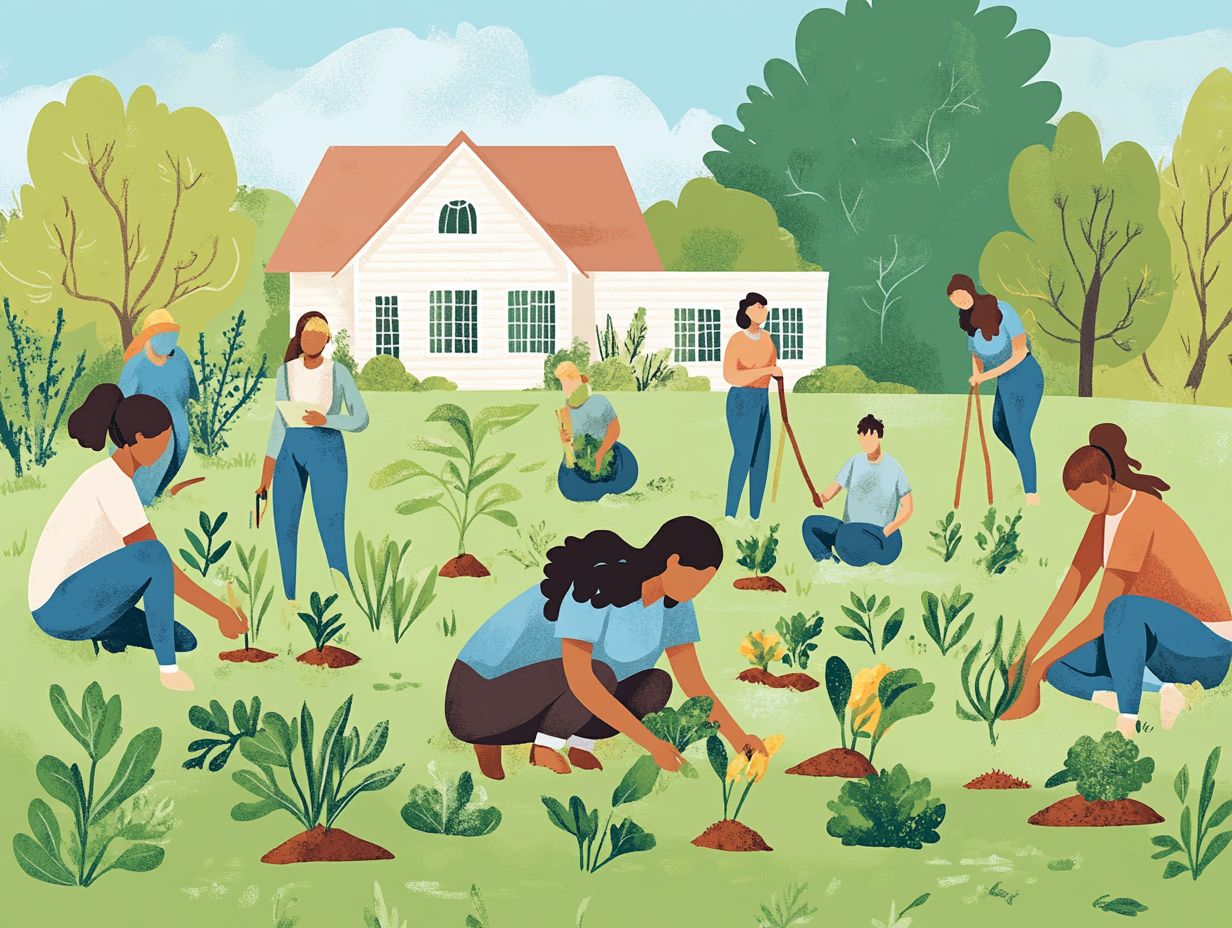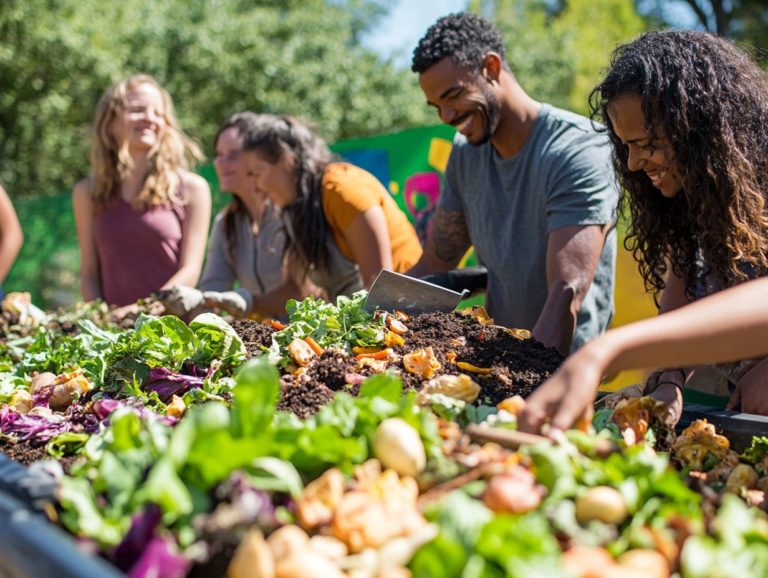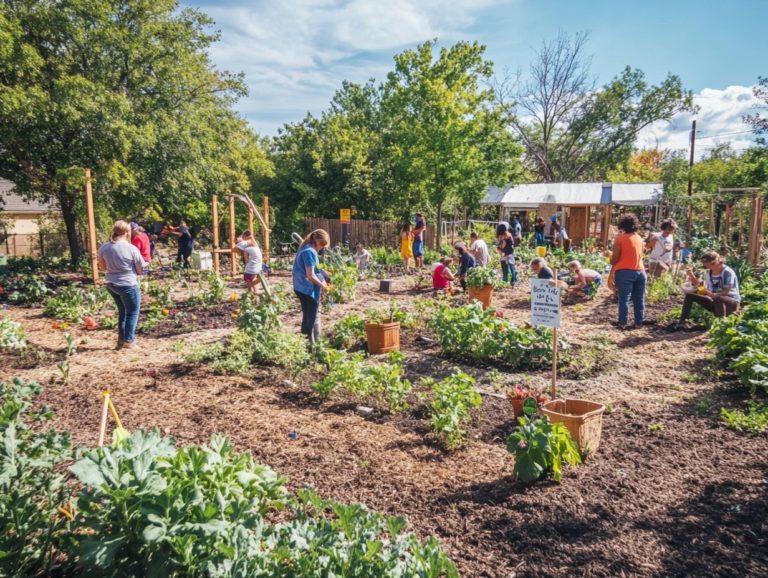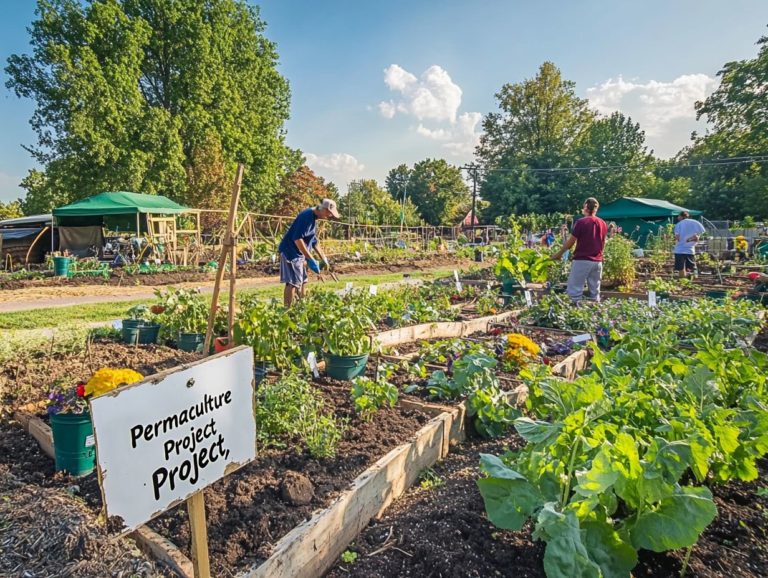6. Volunteer Opportunities in Permaculture Communities
Volunteering in permaculture communities, like Casa Guatemala in the beautiful Rio Dulce region, presents a remarkable opportunity for you to immerse yourself in sustainable practices while making a significant impact on the local farming community.
This guide is your exciting gateway to volunteering in permaculture! It covers everything related to volunteering within these vibrant ecosystems from the diverse volunteer opportunities at your fingertips and the skills you’ll need to the personal growth and environmental benefits that await you, including nutrition education and support for local food production.
Whether you’re an experienced volunteer or contemplating your very first adventure, this information will expertly assist you in navigating the enriching realm of permaculture volunteering.
Contents
- Key Takeaways:
- 1. Volunteering in Permaculture Communities: What to Expect
- 2. Types of Volunteer Opportunities Available in Permaculture Communities
- 3. Benefits of Volunteering in Permaculture Communities
- 4. How to Find Volunteer Opportunities in Permaculture Communities
- 5. Important Skills and Qualities for Volunteering in Permaculture Communities
- 6. Tips for a Successful Volunteer Experience in Permaculture Communities
- 7. The Role of Volunteers in the Permaculture Movement
- 8. Impact of Volunteering in Permaculture Communities on the Environment
- 9. Understanding the Unique Challenges of Volunteering in Permaculture Communities
- 10. How Volunteering in Permaculture Communities Can Lead to Personal Growth
- 11. The Importance of Community and Collaboration in Permaculture Volunteering
- 12. Examples of Successful Volunteer Projects in Permaculture Communities
- 13. How to Make the Most of Your Volunteer Experience in Permaculture Communities
- 14. The Future of Volunteering in Permaculture Communities
- 15. How to Stay Involved in the Permaculture Movement After Volunteering
- Frequently Asked Questions
- What are some possible volunteer opportunities in permaculture communities?
- How can I find volunteer opportunities in permaculture communities?
- What skills are needed for volunteering in permaculture communities?
- Can I volunteer in permaculture communities if I have no experience in permaculture?
- What are the benefits of volunteering in permaculture communities?
- Are there any age restrictions for volunteering in permaculture communities?
Key Takeaways:
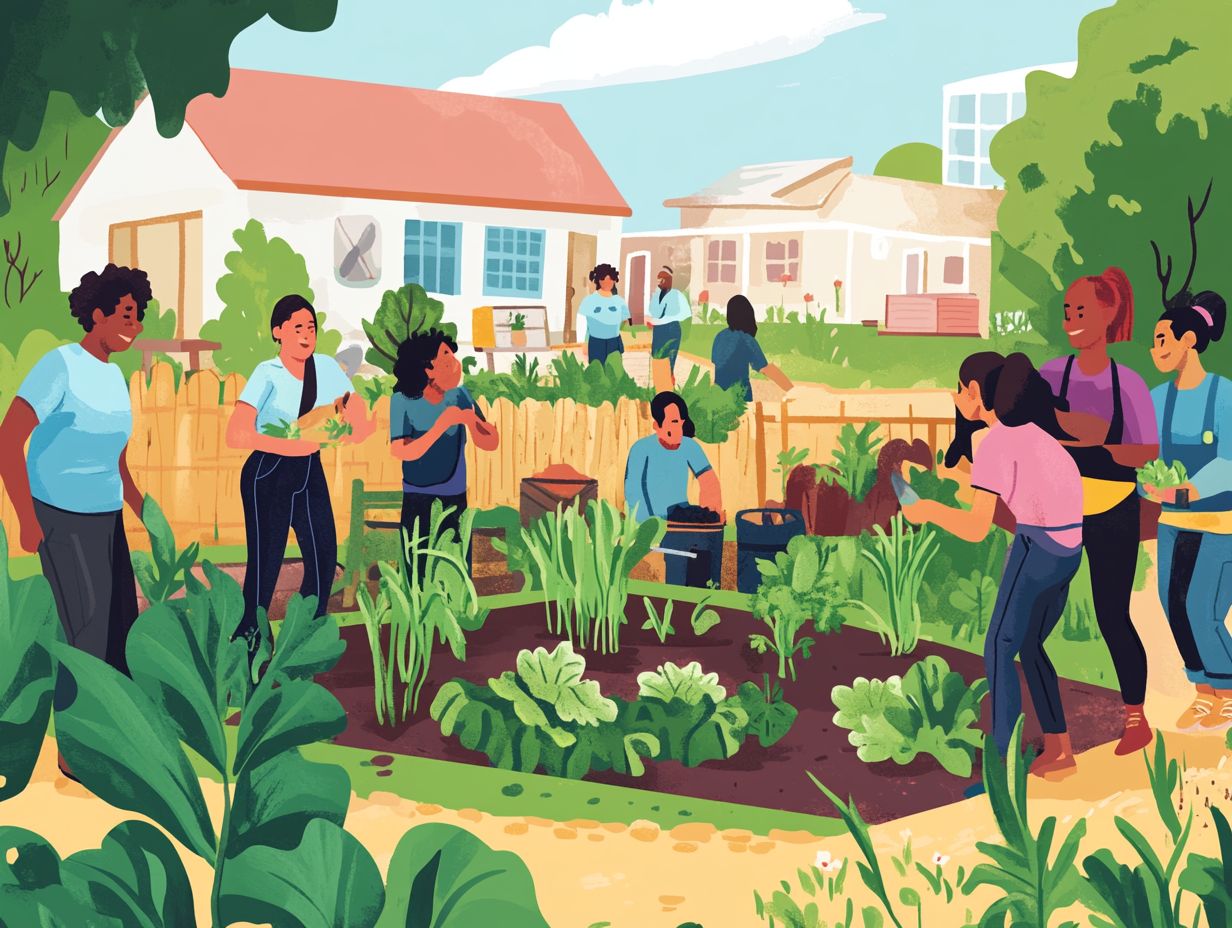
- Experience hands-on learning in sustainable living through volunteering in permaculture communities.
- Gain valuable skills and knowledge while making a positive impact on the environment through various volunteer opportunities.
- Be part of a supportive community and contribute to the growth of the permaculture movement through volunteering.
1. Volunteering in Permaculture Communities: What to Expect
Volunteering in permaculture communities, like Casa Guatemala in the beautiful Rio Dulce region, provides a remarkable chance for you to connect with local farmers and indigenous groups committed to sustainable agriculture and holistic nutrition for families in need.
Here, you will learn practical farming skills and gain insights into organic planting, crop rotation, and the variety of different plants and animals in the environment. Daily activities will have you planting seeds, caring for gardens, and harvesting fresh produce, all of which play a crucial role in local food production and community wellness.
You will participate in nutrition education workshops, exploring the advantages of incorporating fresh, local ingredients into meals, which are crucial for promoting community wellness. You will build meaningful relationships with residents while collectively embracing eco-friendly practices like rainwater harvesting and composting, all vital for a thriving eco-village. Together, you will actively nurture the environment and enhance food security now and for the future.
2. Types of Volunteer Opportunities Available in Permaculture Communities
Permaculture communities present a wealth of diverse volunteer opportunities in Guatemala, ranging from hands-on agricultural projects to educational roles designed to engage local farmers and children in the principles of sustainability.
You might consider a position such as Farm Coordinator, where you will oversee daily operations and ensure that best practices are effectively implemented in cultivation techniques. If you have a knack for construction, you could step into the role of Natural Building Specialist, sharing your expertise in sustainable building methods using locally sourced materials with volunteers and community members alike, while also enhancing self-sustainability.
For those passionate about teaching, there are opportunities to impart knowledge about permaculture principles to eager learners of all ages. These roles not only enhance your personal skills and provide a sense of fulfillment but also play a crucial part in fortifying the community s resilience by nurturing a deeper connection to the land and sustainable living practices.
3. Benefits of Volunteering in Permaculture Communities
Volunteering in permaculture communities sharpens your personal skills. It also enhances the health and wellness of local communities through sustainable practices and nutrition education.
By diving into hands-on projects that prioritize caring for the environment, you will acquire valuable gardening skills while nurturing a sense of responsibility toward nature. This involvement fosters personal growth as you develop leadership and teamwork skills while collaborating with diverse groups.
These initiatives directly influence local food systems by cultivating fresh produce and supporting the local economy. This strengthens community ties and promotes food security. Supporting sustainable agriculture also generates jobs, stimulates local markets, and ensures that healthy food options remain accessible to everyone.
4. How to Find Volunteer Opportunities in Permaculture Communities
Finding volunteer opportunities in permaculture communities, such as Casa Guatemala, is entirely within your reach through various platforms and networks designed to connect you with meaningful agriculture projects.
Beyond directly contacting organizations, you can explore volunteer networks and local listings that specialize in agricultural initiatives. Social media groups are also treasure troves, offering real-time postings and lively discussions about permaculture.
By actively engaging with coordinators involved in these agricultural projects, including the Volunteer Coordinator role, you enhance your prospects and gain invaluable insider knowledge about upcoming opportunities. This proactive approach boosts your chances of landing a suitable role while nurturing valuable relationships within the dynamic permaculture community.
5. Important Skills and Qualities for Volunteering in Permaculture Communities
To thrive in permaculture communities, bring your skills in teamwork and adaptability! A passion for sustainable agriculture, health, and nutrition is essential.
Effective coordination and communication are crucial for ensuring projects run smoothly and that everyone is aligned. When you express your ideas clearly and listen actively, you create an environment where collaboration can flourish. Personal qualities like empathy and a genuine commitment to community welfare significantly enhance participation and support among your fellow volunteers.
As you navigate diverse perspectives within the group, your ability to connect on a human level profoundly impacts the overall success of the initiatives you undertake together.
6. Tips for a Successful Volunteer Experience in Permaculture Communities
Understanding the local culture can make your volunteering experience unforgettable! Your preparedness for challenges and full engagement with the provided accommodations and meal offerings are vital.
To truly thrive, take the time to learn about local customs and practices. This knowledge will enhance your interactions with long-term residents and foster mutual respect. It s essential to manage your expectations, recognizing that adaptability is key. Unexpected situations may arise, and a positive mindset will be your best tool for navigating these moments.
Engaging with the community can be as simple as participating in local events or collaborating on projects, such as those at a family farm. These connections will enrich your experience. Prioritize your wellness by maintaining a balanced diet, staying hydrated, and incorporating relaxation techniques like yoga or mindfulness to keep your energy levels high and your spirits uplifted.
7. The Role of Volunteers in the Permaculture Movement
Volunteers are essential to the permaculture movement. They champion sustainable agriculture practices, educate local farmers, and foster community engagement in self-sustainability initiatives.
Their involvement influences meaningful change through direct action and impactful collaboration, especially in eco-friendly projects. For example, you might find volunteers organizing workshops to share insights on organic farming techniques, empowering farmers to enhance crop yields while honoring natural ecosystems.
Many volunteers establish vital partnerships with local schools and organizations to promote environmental education. This nurtures a new generation of eco-conscious citizens. Notable instances include community gardens that thrive thanks to volunteer-led initiatives, inviting families to explore sustainable practices while weaving together social bonds that enrich the community s fabric.
8. Impact of Volunteering in Permaculture Communities on the Environment
Volunteering in permaculture communities offers a unique opportunity to positively impact the environment. It promotes sustainable practices that elevate local food production and preserve biodiversity, especially in regions like Guatemala.
As you engage in hands-on experiences, you ll uncover valuable insights into regenerative agriculture techniques, which restore soil health and promote biodiversity. Methods include companion planting and organic pest management, yielding nutritious crops while restoring ecosystems.
Imagine urban rooftop gardens transforming neglected spaces into vibrant green havens! These innovative projects effectively reduce urban heat and enhance air quality.
Initiatives like community seed banks encourage the preservation of heirloom varieties and local agriculture. They foster genetic diversity and resilience. These inspiring examples show how collective efforts in permaculture benefit participants and contribute to broader environmental health, promoting a lifestyle that emphasizes balance and sustainability, ultimately transforming our approach to agriculture.
9. Understanding the Unique Challenges of Volunteering in Permaculture Communities
Volunteering in permaculture communities, such as those in Guatemala, can be an incredibly rewarding experience. However, it comes with its own set of unique challenges. You ll need to adapt to local customs and learn effective farming techniques from local farmers, which can be quite the journey.
Language barriers may arise, hindering your ability to connect with locals. These barriers can complicate your understanding of agricultural practices and community dynamics, leading to misunderstandings, particularly in areas like Rio Dulce where diverse cultures intersect.
Practical obstacles, such as limited access to resources like food and accommodation, or varying levels of physical fitness among volunteers, can add to the complexity.
To navigate these challenges, embrace immersive language-learning techniques. Participate in nutrition education sessions to enhance your communication efforts. Be open to new ideas regarding cultural practices to foster deeper relationships.
Create adaptive project plans that consider different skill levels so everyone can contribute meaningfully, whether through farming, education, or assisting with the local medical clinic.
Building a supportive community among volunteers and local farmers will help you overcome practical limitations and enrich your experience.
Are you ready to make a difference? Get involved in volunteering in permaculture communities and transform your life!
10. How Volunteering in Permaculture Communities Can Lead to Personal Growth
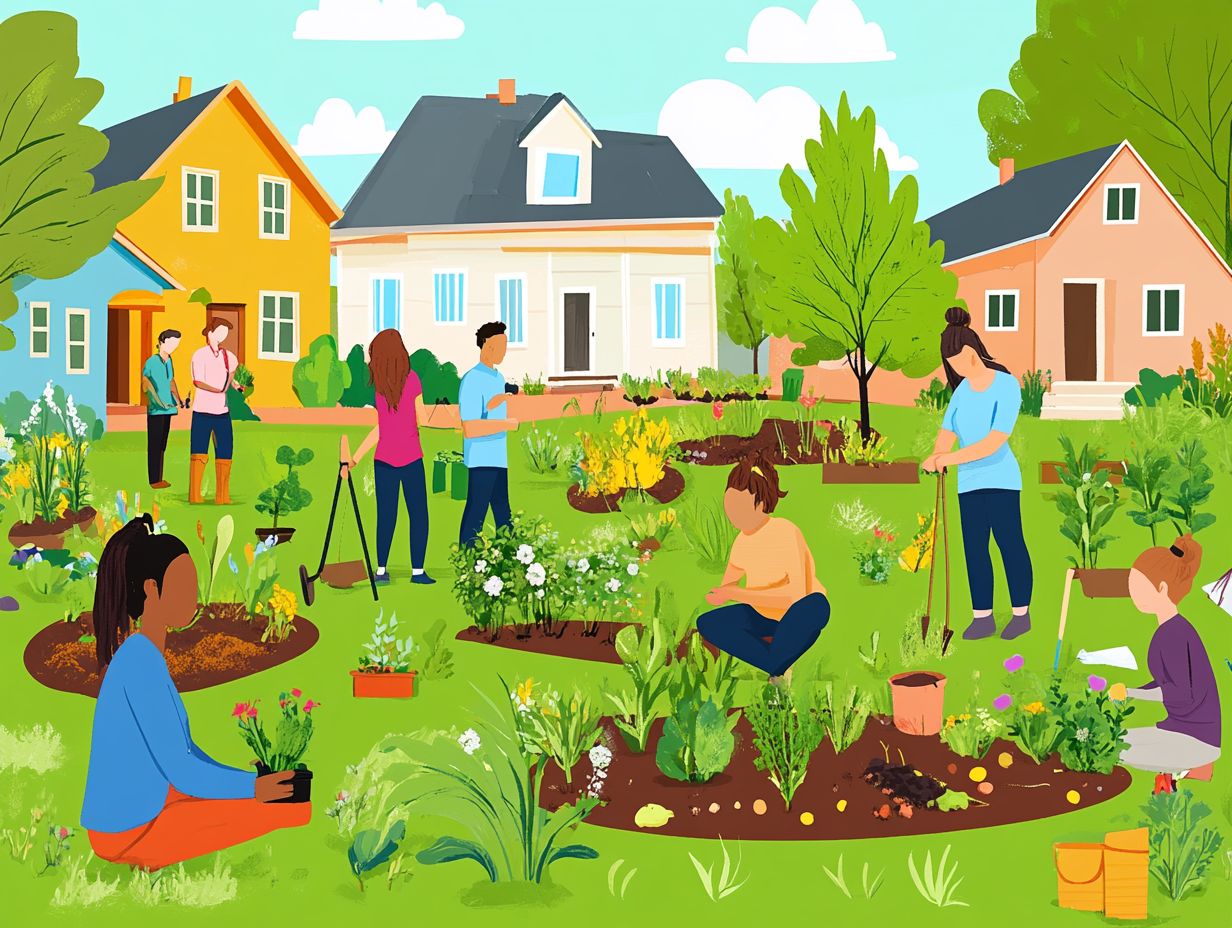
Volunteering in permaculture communities enriches the local environment and is a way to grow personally. It provides you with new skills and transformative life experiences through hands-on work in sustainable agriculture.
By stepping outside your usual routines, you embrace innovative farming techniques. You deepen your understanding of sustainable practices, including organic methods that focus on self-sustainability.
Engaging with diverse groups helps you build meaningful connections and nurtures empathy. You work together to tackle communal challenges, especially when collaborating with indigenous communities.
This experience cultivates a heightened sense of self-awareness and resilience in the face of adversity. These qualities are vital for navigating the complexities of farming.
As you adapt to new environments, you uncover your potential. You master teamwork and problem-solving skills that extend beyond farming and into community resilience.
Through this journey, you emerge not just as a contributor to your community but as a more confident and adaptable individual. You’re ready to take on new volunteer opportunities.
11. The Importance of Community and Collaboration in Permaculture Volunteering
Community and collaboration are essential pillars in permaculture volunteering. They drive the success of sustainable agriculture projects and foster meaningful partnerships among you, local farmers, and indigenous communities.
Such initiatives do more than promote ecological awareness; they empower you and others. You create a nurturing environment where diverse skills in farming and community development can flourish.
For instance, when you partner with local farmers to establish a community garden, you’re not just cultivating fresh produce. You’re deepening social ties within the neighborhood and enhancing local food production.
This project can become an exciting hub for learning! It demonstrates how your collective efforts enhance knowledge sharing about sustainable practices and resource utilization.
Engaging with indigenous communities revitalizes traditional practices. It highlights the significance of infusing local wisdom into contemporary farming methods with a focus on nutrition.
These collaborative efforts prove that teamwork is essential right now! They showcase the importance of achieving impactful and sustainable outcomes, further solidifying local economies.
12. Examples of Successful Volunteer Projects in Permaculture Communities
Successful volunteer projects in permaculture communities, like those at Casa Guatemala, exemplify the power of sustainable agriculture. They also feature educational initiatives designed specifically for local farmers and children.
At Casa Guatemala, you’ll find volunteers involved in transformative projects that impart essential farming techniques. They cultivate a sense of environmental stewardship among the youth, promoting an eco-friendly lifestyle.
One standout initiative features the creation of a community garden. Participants plant native crops and learn methods like companion planting and organic pest management, contributing to local food source sustainability.
The project’s goals center on enhancing local food security and promoting biodiversity. Families report improved harvests, while children gain a deeper appreciation for their natural resources and the importance of healthy nutrition.
The collaborative spirit of these efforts underscores the importance of working together for community resilience. They empower individuals with invaluable skills that can be passed down through generations, particularly in areas related to farming and education.
13. How to Make the Most of Your Volunteer Experience in Permaculture Communities
To truly maximize your volunteer experience in permaculture communities, seize every learning opportunity and immerse yourself in the local culture. Actively contribute to addressing the challenges the community faces, such as health and nutrition.
Engage wholeheartedly in hands-on projects. This is where you can apply your skills and witness the immediate impact of your efforts, especially in local agriculture projects. It s invaluable to connect with local farmers, who often hold a wealth of knowledge about sustainable practices and the unique needs of the land. Engaging them in conversation and posing thoughtful questions can open doors to rich educational experiences that deepen your understanding of local farming techniques.
Keep in mind that adaptability is essential, especially when working on family farms or in community-led initiatives. Being open to change and ready to adjust your approach will enhance your experience and showcase your commitment to the community’s dynamic needs. This paves the way for further opportunities.
14. The Future of Volunteering in Permaculture Communities
The future of volunteering in permaculture communities holds great promise for you. It is fueled by a rising awareness of sustainability, innovative agricultural practices, and the strong dedication of local farmers and volunteers like yourself.
As society increasingly acknowledges the vital role of environmental stewardship, you may find yourself at the forefront of integrating new tools think drones and analyzing information to make better farming decisions into traditional farming methods. This evolution brings exciting opportunities for you to learn and engage, enabling you to leverage technology for enhancing soil health, biodiversity, and resource management in ways that support the local economy.
With a growing focus on community-driven initiatives, your role as a volunteer will be crucial in identifying and tackling localized ecological challenges. These challenges particularly affect food security and nutrition. By sharing your skills, knowledge, and creativity, you have the power to shape sustainable practices that evolve with your community’s unique needs, fostering partnerships that enhance local food production.
15. How to Stay Involved in the Permaculture Movement After Volunteering
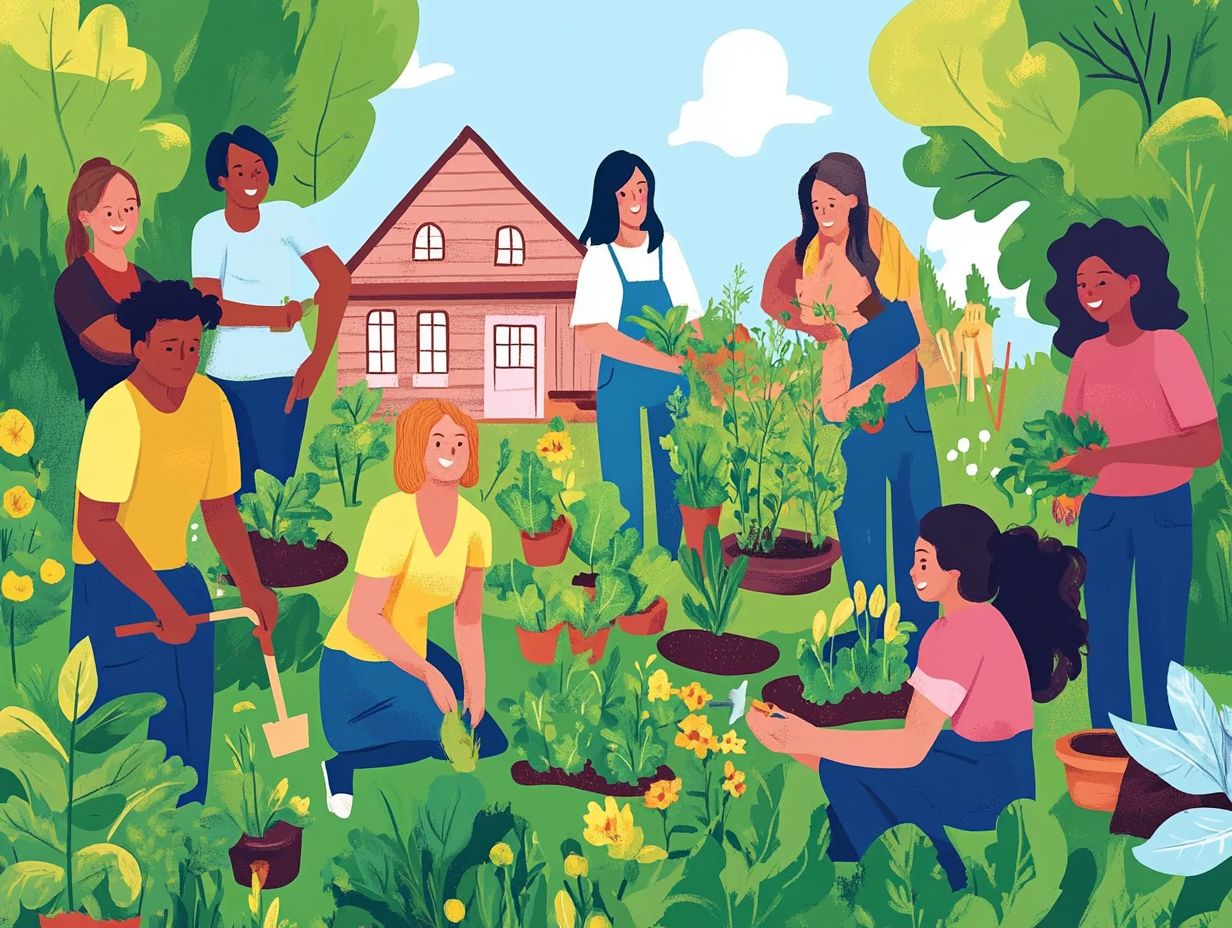
Staying actively engaged in the permaculture movement after your volunteering experience is crucial for nurturing lasting relationships with local farmers and championing sustainable practices within your community, particularly in areas like Vancouver, BC.
One of the most effective ways to maintain these connections is by joining local networks dedicated to agricultural sustainability. Participate in workshops that focus on practical skills. These workshops will provide you with valuable education and skills, empowering you to adopt eco-friendly practices in your own garden, which can support local food markets.
Support agricultural projects whether through donations to initiatives like Granja de los Ninos or hands-on involvement. This collective engagement not only deepens your connections but also enhances the overall resilience of the community. This ensures that the principles of permaculture are firmly established for future generations and that local children are educated on its importance.
Frequently Asked Questions
What are some possible volunteer opportunities in permaculture communities?
Some possible volunteer opportunities in permaculture communities include:
- Gardening
- Composting
- Building and maintaining structures
- Teaching workshops
- Organizing events related to local farming and nutrition
How can I find volunteer opportunities in permaculture communities?
You can find volunteer opportunities in permaculture communities by:
- Researching online
- Contacting local permaculture organizations, like those in Brazil or Colombia
- Attending permaculture events and networking with others
Take immediate steps to engage with your local communities and make a difference!
What skills are needed for volunteering in permaculture communities?
Volunteering in permaculture communities requires various skills, such as gardening, building, and teaching. A basic understanding of permaculture principles, especially in tropical areas, can also help.
Can I volunteer in permaculture communities if I have no experience in permaculture?
Absolutely! Many permaculture communities welcome volunteers of all skill levels. You ll have the chance to learn new skills while making a positive impact.
What are the benefits of volunteering in permaculture communities?
Volunteering lets you practice sustainable living skills and connect with others who share your values. It s a great way to contribute to your local community!
Are there any age restrictions for volunteering in permaculture communities?
Age requirements vary by community. Some organizations, like Anne Frank’s initiatives, may have specific age restrictions for certain tasks. Check with the community you re interested in for details.

